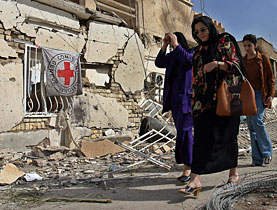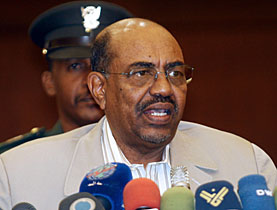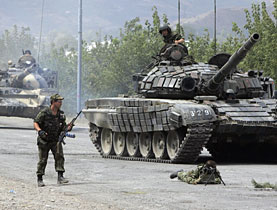In hard times, a comeback for soft power

The election of Barack Obama as the next president of the United States has marked a symbolic change in how the world's largest power approaches and resolves conflict.
But some of the principles outlined in the Obama platform and in his campaign rhetoric – dialogue, multilateralism and a more conciliatory approach to statecraft – are already being employed, a conference in Switzerland’s capital heard on Tuesday.
“The difference has already started,” Mari Fitzduff, an expert in peace processes, told delegates attending the 20th annual meeting of the Swiss peace foundation, swisspeace, in Bern.
Fitzduff, an Irish-born academic now based at Brandeis University in Massachusetts, was referring to a shift in US strategy in Iraq, championed in part by General David Petraeus, who until September oversaw all US forces in that country.
That shift has been from a hard-dealing, unilateralist ethos that characterised the presidency of George W. Bush towards “soft power”. In Iraq and other parts of the world, it means interacting with democracy and local government – gaining influence through connections and relationships rather than on the basis of owning the bigger stick.
“What has happened has been a sea change completely,” Fitzduff said. “No longer do we win wars through our military.”
While the marked decrease in violence in Iraq since mid-2007 has corresponded with an increase in US forces in certain trouble spots – the so-called surge – US Secretary of Defense Robert Gates has suggested directing funds from the country’s war budget to the country’s diplomats in the Department of State.
Moving forward
The list of states that need rebuilding – or that may within the next decades – extends beyond the Middle East and into Africa, Asia and eastern Europe.
Fitzduff highlights the broken barriers of an increasingly globalised world and the political fissures that have led to a rise in the number of countries; since the establishment of the United Nations in 1945, the count has grown from under 50 to around 200.
“Even as power is accruing to the regional and to the global, we still have people, hoping for their state, a little power for their people, their embassy, their military, et cetera,” she said.
Within this context, it is non-governmental organisations that are increasingly taking on the responsibility of rebuilding troubled states, Fitzduff says. Some have budgets larger than individual governments and in certain countries, they are the conduit through which the UN funnels most of its budget.
“I was struck at the extraordinary growth of NGOs,” Fitzduff said, but added that there has been a debate over who has a seat at the political negotiating table.
She refers to a “begrudging acceptance” among some multilateral institutions that the presence of civil society – which in the broadest sense include charities, religious organisations and trade unions – is here to stay.
“There are a lot more opportunities for power and greater influence,” she said.
The role of business
John Bray, a Tokyo-based risk analyst with the firm Control Risks and a conference presenter, told swissinfo the private sector plays a unique role as countries move out of conflict.
“The private sector offers a way out that the state can only partially facilitate,” he said. He believes that while firms can lend their expertise to the rebuilding process and that partnerships with civil society and government are beneficial, they should not have the same seat at the table.
Rather, he argues the core responsibility of business is to do what it does best: creating prosperity based on what he calls “repeatable win-win relationships”.
These partnerships stand out especially in poor countries where a small number of large firms comprise much of a government’s tax base. In the West African state of Liberia, the Firestone Natural Rubber Company offers not only jobs but health services, education and housing for its employees and their families.
Even if Firestone was absent from the peacemaking table, its social engagement with the thousands of Liberians it does not directly employ fits in with the government’s agenda to keep the peace.
But how many secondary responsibilities should companies take on?
“The dividing line is almost always fuzzy, especially in a weak state,” Bray said. “By taking on certain responsibilities, are you weakening state capacity to do things the state ought to do?”
Bray says each situation has its own answer but advises companies to err on the side of doing good. He calls predatory, divide-and-conquer business practices unsustainable.
“It’s not just profit maximisation,” he told swissinfo. “It’s profit maximisation in a way that’s compatible with integrity. I do think business has more legitimacy in as much as it works collectively.”
swissinfo, Justin Häne
The Swiss Peace Foundation swisspeace is a research institute focusing on conflict analysis and peacebuilding.
Founded 20 years ago, it researches the causes of war and develops tools to help governments and non-governmental organisations recognise and resolve conflict.
The organisation does not focus on political activism but is working to develop new approaches to mediation and conciliation, with a focus on synergy between different actors.
swisspeace is based in Bern and employs around 30 people. Its main clients are the Swiss government, the Swiss National Science Foundation and international organisations.
Professor Mari C. Fitzduff is professor and director of the International MA Programme in Coexistence and Conflict at Brandeis University in the United States.
Born in Ireland, she participated in the conflict resolution process in Northern Ireland and has consulted in Africa, Asia and the Balkans.
Her areas of expertise include peace processes, public policy on diversity issues and issues of coexistence in inter-societal conflict.
John Bray is a political risk specialist with the firm Control Risks.
Based in Japan, he works mainly on international projects and has experience in Asia, Europe and Africa.
His main areas of expertise include private sector policy issues in conflict-affected areas, anti-corruption strategies, and business and human rights.
He holds an MA in History from the University of Cambridge.

In compliance with the JTI standards
More: SWI swissinfo.ch certified by the Journalism Trust Initiative


You can find an overview of ongoing debates with our journalists here. Please join us!
If you want to start a conversation about a topic raised in this article or want to report factual errors, email us at english@swissinfo.ch.